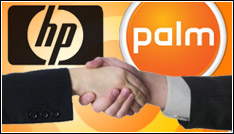

Hewlett-Packard will use Palm’s WebOS operating system in devices beyond phones and tablets, including printers, according to comments by chief executive Mark Hurd
During a conference call to announce strong quarterly earnings, Hurd said that the goal of HP’s proposed $1.2 billion (£800m) acquisition of ailing Palm is the company’s mobile operating system, webOS, which HP plans to spread throughout its stable of connected device, including Web-enabled printers.
HP offers a wide range of connected devices that would benefit from having a common operating system, he said: “We expect to leverage WebOS into a variety of form factors, including ‘slates’ and Web-connected printers.”
HP had been developing a tablet PC called Slate that was set to run on Microsoft’s Windows 7 operating system and challenge Apple’s popular iPad. However, once HP announced is intentions to buy struggling Palm, the industry soon heard that the technology giant had ditched the Slate in favor of creating another tablet, dubbed Hurricane, which will run the widely-praised webOS.
Reports have said that a webOS-powered Hurricane could hit the market as early as the third quarter. Hurd said that HP’s intention is to be a player in the tablet market, which he believes will not be dominated by a single product, but rather be a robust space with a number of alternatives from different vendors.
As the world becomes more mobile, there will be a wide range of preferences in what customers want from their devices. They will demand choice, he said.
Hurd said that despite the change of direction in HP’s tablet plans, Microsoft was still an important partner.
“Microsoft is probably one of the best relationships we’ve got in our company, and they’re still extremely important to us,” he said. “There are a couple of form factors, though, that are very attractive for us, and these small form factors is where we think the IP can be very additive.”
Hurd said the real driving force behind the Palm acquisition is webOS. With so many connected devices in their product portfolio, HP officials believe it’s important to have a common operating system on which to run them, he said.
Page: 1 2
American space agency prepares for testing of Boeing's Starliner, to ensure it has two space…
As UK and Europe develop closer military ties, European Commission says it will invest €1.3…
Zuckerberg seeks to revive Facebook's original spirit, as Meta launches Facebook Friends tab, so users…
Notable development for Meta, after appeal against 2021 WhatsApp privacy fine is backed by advisor…
First sign of shake-up under new CEO Lip-Bu Tan? Three Intel board members confirm they…
Trump's nominee for SEC Chairman, Paul Atkins, has pledged a “rational, coherent, and principled approach”…